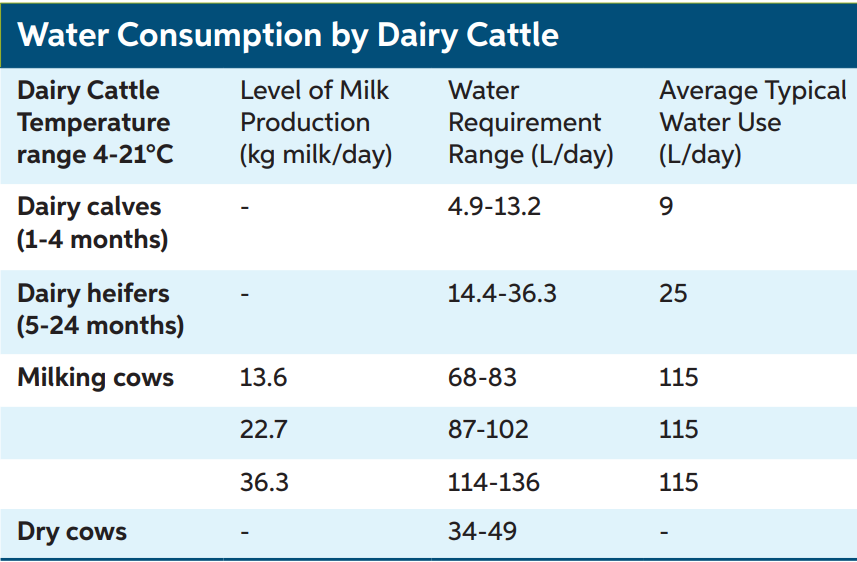Water is a crucial component of optimum animal health and investing in a water system that delivers for your herd will deliver for you in the long-term.
But key to designing a good system is understanding your herd’s needs.

Water requirement
The daily water requirement of your herd can vary significantly – size, growth stage, and output level all have a strong influence.
Dairy cows (in milk), for example, can require 100-120L/day.
The water content of an animal’s diet will influence its drinking habits.
For example, forage or feed with high-moisture content decreases the quantity of drinking water required.
When grass dry matter (DM) is high, cows (in milk) may have to drink more than 80% of their requirement, with the remainder coming from forage.
Another important thing to note is that cows tend to drink 30-50% of their water requirement within one hour of milking.
To meet these requirements, the following three things are critical:
- Accessibility to the trough;
- Flow rate or volume;
- Trough capacity or drinking area around the trough.
Testimonial
“A few years ago, I invested in a new water system following issues with health, fertility, and yield. I couldn’t be happier with it and it’s given me great peace of mind. I am producing more milk from fewer cows and there’s no stress in the herd.”
Dairy farmer, Diarmuid Connell from Kells, Co. Meath, who milks 60 cows on a 60ac grazing platform.
Why so important?
Providing enough quality water is essential for good herd husbandry; water comprises 80% of the animal’s bodyweight and 87% of the milk it produces.
Water regulates body temperature and is vital for organ functions such as digestion, waste removal and the absorption of nutrients.
Consumption rates
Water-consumption rates can be affected by a range of factors.
Dietary, environmental, and management factors include:
- Air temperature;
- Relative humidity;
- Level of animal exertion;
- Milk output.
Water-quality factors include:
- Temperature;
- Salinity;
- Impurities affecting taste and odour.

Make sure your ‘water works’
With warmer days upon us, now is the time to ensure that your herd’s system works effectively and efficiently, and can withstand challenges.

Remember these key facts when considering if your ‘water works’ for your herd:
Quantity
Dairy cows (in milk) need 100-120L/day and drink 30-50% of this requirement within one hour of milking. Suckler cows typically drink in the range of 43-65L and one to two-year-old beef heifers consume 35-56L.
Piping
A fill rate of 2,500L/hr will be needed to meet the herd’s requirement in the first hour after milking. Hydro Piping Heavy Gauge and Hydro Piping Normal Gauge – both of which carry potable water – are worth considering. Both are light, have a smooth surface and work with PSIs of 150 and 70, respectively.
Pipe size
Pipe size, throughput capacity of ballcock, and water pressure – together – will determine flow rate. A good flow rate can be achieved with help from the Hanson Concrete Trough Pack. The pack can operate in clean or dirty water applications, and its piston valve has been designed with multiple thread and connection combinations.
Water trough location
Locating troughs in the centre of paddocks increases drinking space, reduces cow walking distance, and facilitates multiple grazing options. Two trough options are: the 150gl Spillane Concrete Trough BTM Fill, which is reinforced with steel and fibre, and has increased wall thickness at the corners for added strength; and the 40gl Spillane Concrete Trough Top Fill, with its large capacity bung for fast and easy drainage.
Large trough capacity can compensate somewhat for flow rate – 10% of the herd should be able to drink simultaneously with a recommended available volume of 15gal/cow.
Land drainage
In dry conditions, capacity requirements could be almost doubled and land drainage may need to be considered.
The Yellow Coil Land Drainage Pipe and the Perforated Black Coil Land Drainage Pipe are good options depending on drainage requirements.
The former has been used successfully in agricultural fields for years, has been designed to suit Irish climatic conditions and conforms to Department of Agriculture, Food and the Marine specifications.
The latter is made from high-density polyethylene for strength, and will not collapse under weight of pressure.
Water quality
Poor water quality can impact animal health or discourage drinking and, thus, impact production.
Temperature, salinity and impurities affecting taste and odour need to be monitored and rectified.
Further information on all the products listed above is available here. Alternatively, you can call into your local Glanbia branch.

